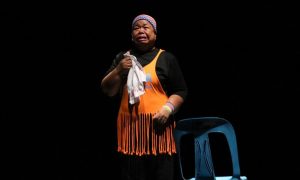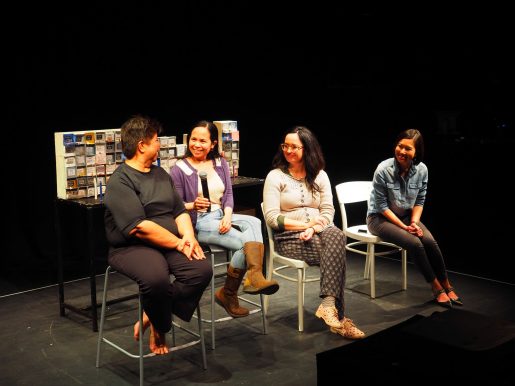This post is part of a series of short reviews of Tao Po, a one-person play that grapples with the Philippines’ “war on drugs”. Read Emerson M. Sanchez’s introduction here.
The play Tao Po (Is Anybody Home?) showcases the human lives in the drug war. It speaks to the audience, as fellow human beings, through intimate stories that take us to the drug war’s guts and its violences.
In the four monologues of Tao Po, the phrase takes on different forms: that beyond numbers, those killed in the “drug war” are actual people with families, lovers, and friends—tao po (people). That victims and perpetrators in the “drug war” are people who make mistakes—tao lang po (only human). My take is that in addition to these, actual people are perpetrators in the “drug war” and could be made accountable—tao pa rin (still human). Furthermore, the people in the media and the general public play crucial roles in the legitimation of the “drug war”—mga tao rin, at tayo rin (we, the people too).
Tao Po takes on another meaning when Filipinos see it abroad. Many of us call the Philippines home. Many of us left the islands to support our families who stayed behind.
Yet, our location removes us far from the everyday struggle of Filipinos in the Philippines. When news from the Philippines reaches us through abridged digests, social media filters, and the voices of loved ones, we are faced with the challenge of seeing both the important details and the big picture.
Tao Po invites us to listen to four people’s intimate accounts of the drug war. The astonishing Mae Paner animated the four monologues wrapped in wit and humour.
The Zumba instructor’s participation in the drug rehabilitation program is full of irony and (literal and figurative) dimensions. One of the memorable metaphors in this piece is the apparition of ghosts. To me, the ghosts represent haunting issues within the family, the implication of barangay (village) officials in police operations, and the faulty Philippine justice system. The monologue further suggests the multiple burden left with the women in the community to provide for and care for orphans, and the mental and emotional health toll this entails.
Collectively, the four monologues describe how cascades of violence operate from everyday violence (structural machismo and precarious poverty) to the spectacle of extrajudicial killings (dead bodies wrapped in packaging tape and labeled drug pusher), the violence captured in images, and the violence of impunity (unsolved killings, continued operations, silent audiences). Tao Po sparks conversations about what it means to be human in the time of inhumane treatment of suspected criminals, and what it means to be a Filipino watching a war against the poor at home.
To me, watching Tao Po and doing nothing to counter the cascades of violence contributes to the culture of impunity.
The very play knocks on the hearts of the audience and inspires us to take action—tao po! (anyone there!)
 Facebook
Facebook  Twitter
Twitter  Soundcloud
Soundcloud  Youtube
Youtube  Rss
Rss 


